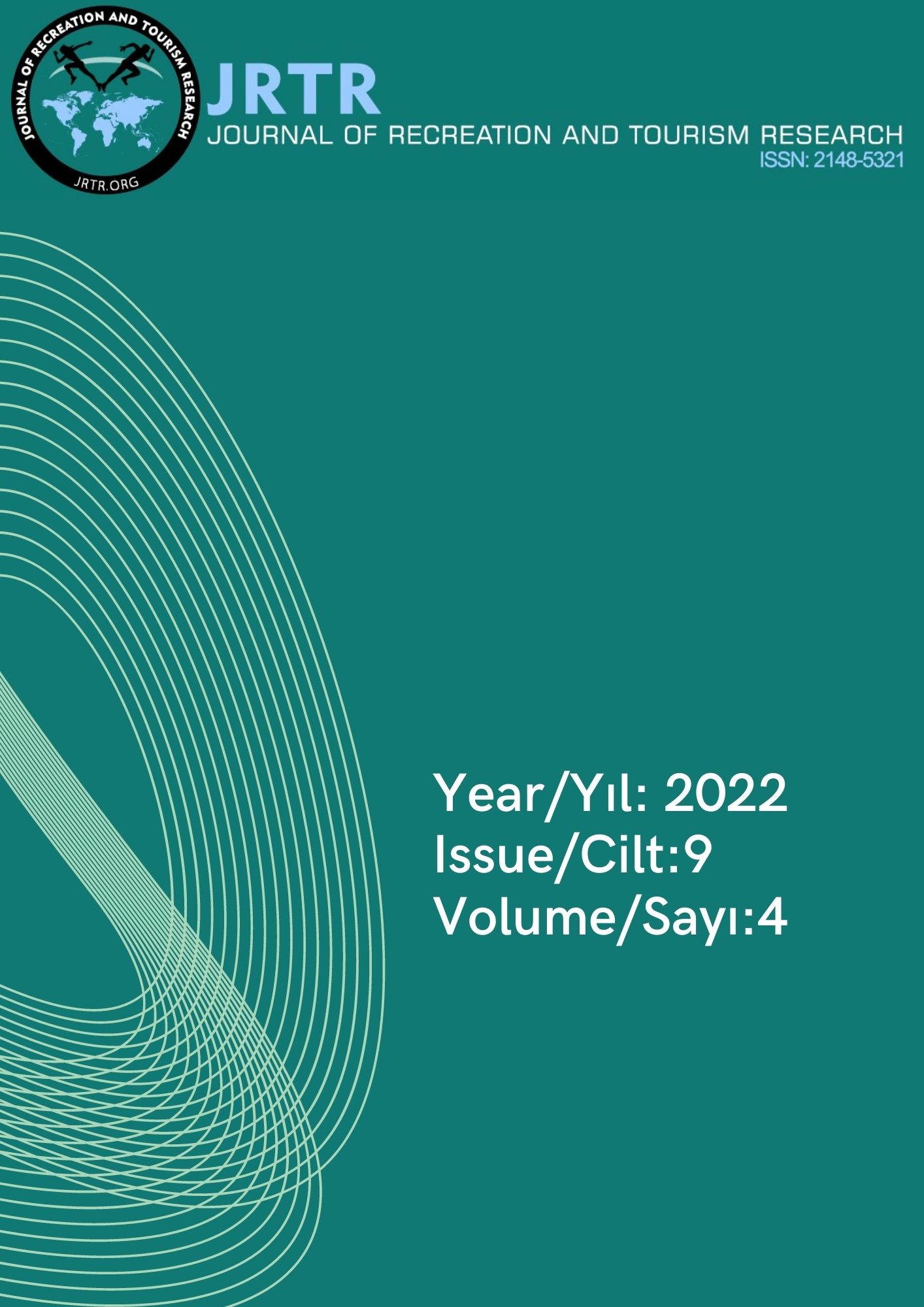RECREATIONAL SPORTS WELL-BEING SCALE(RSWBS) TURKISH VERSION: VALIDITY AND RELIABILITY STUDY
DOI:
https://doi.org/10.5281/zenodo.7494871Keywords:
Recreational Sport, Well-Being, Validity, ReliabilityAbstract
This research aimed to adapt the "Recreational Sport Well-Being Scale", developed by Pi L-L, Chang C-M, and Lin H-H. (2022), to the Turkish language and culture by performing its validity and reliability. The study participants were individuals aged 20 and older who participate in recreational sports. The 'Recreational Sport Well-Being Scale original form consisted of a total of 4 sub-dimensions and 14 items. To adapt the scale to the Turkish language and Turkish culture, the linguistic validity of the scale was ensured by using the translation-back translation method. SPSS 20 and LISREL 8.80 programs were used for data analysis. The construct validity of the scale with 4 factors and 14 items in its original form was examined by confirmatory factor analysis (CFA). Cronbach's Alpha internal consistency coefficients were calculated to test the reliability level of the scale. To test the reliability of the Turkish version of the scale, Cronbach's Alpha internal consistency coefficient and item-total correlations were calculated. Moreover, the most frequently used goodness of fit indices was explained in the studies in the literature. According to the results obtained, the Recreational Sports Well-Being Scale, which consisted of 14 items and 4 sub-dimensions (RSWBS), was a valid and reliable measurement tool in the Turkish language and culture. Besides, the scale can be used in studies as a scientific tool to measure the recreational sports-based well-being of individuals older than the age of 20.
Downloads
References
Alpar, R. (2006). Spor Bilimlerinde Uygulamalı İstatistik. 3. Baskı. İstanbul: Nobel Yayıncılık.
Başoğlu, U. D. (2013). Relationships between participation in recreational activities and leadership behavior: a study on the secondary school students. Turkish Journal of Sportand Exercise, 15(2), 100-106.Doi: 10.15314-tjse.10317-200724.
Bradburn, N. M. (1969). The Structure of Psychological Well-Being. Chicago: Aldine.
Brown, T.A. (2006). Confirmatory factor analysis for applied research. The Guilford Press
Büyüköztürk, Ş., Çakmak Kılıç, E., Akgün, Ö. E., Karadeniz, Ş., Demirel, F. (2012). Bilimsel araştırma yöntemleri. Pegem Akademi, Ankara.
Carruthers, C. P., & Hood, C. D. (Second Quarter 2004). The Power of the Positive: Leisure and Well-Being. Therapeutic Recreation Journal, 38(2), 225-245.
Çakır, O. (2017). Rekreasyon kavramı ve teorileri. M. Akoğlan Kozak içinde, Rekreasyonel liderlik ve turist rehberliği: kavram ve kuramlar üzerinden bir analiz(s. 36-54). Ankara: Detay Yayıncılık
Çokluk, Ö., Şerkercioğlu, G. ve Büyüköztürk, Ş. (2012). Sosyal Bilimler İçin Çok Değişkenli İstatistik: SPSS ve LISREL Uygulamaları. Ankara: Pegem Akademi.
Dumazedier, J. (1974). Sociology of leisure. Amsterdam: Elsevier.
Gümüşay, M., & Koç, M. C. (2022). Examination of Sports Motivation and Exercise Addiction Levels of Kickboxing Athletes and Individuals Who Do Kickboxing as Recreational Activity. Journal of Pharmaceutical Negative Results, 1821-1833.
Gürbüz, B., Çimen, Z., & Aydın, İ. (2018). Serbest Zaman İlgilenim Ölçeği: Türkçe Formu Geçerlik Ve Güvenirlik Çalışması. Spormetre Beden Eğitimi ve Spor Bilimleri Dergisi, 16(4), 256-265
Karacaoğlu, K., & Köktaş, G. (2016). Psikolojik dayanıklılık ve psikolojik iyi olma ilişkisinde iyimserliğin aracı rolü: hastane çalışanları üzerine bir araştırma. İş ve İnsan Dergisi, 3(2), 119-127. Doi: 10.18394/iid.20391.
Karaküçük, S. (1995). Rekreasyon (Boş Zamanları Değerlendirme):. Ankara: Gazi Üniversitesi Beden Eğitimi ve Spor Yüksekokulu.
Kline, R. B. (2005). Principles and practice of structural equation modeling. New York: Guilford Press.
Li, C.L., & Wang, C.Y. (2012). The factors affecting life satisfaction: recreation benefits and quality of life perspectives. Sports &Exercise Research, 14(4), 407-418.Doi:10.5297/ser.1404.001
Özen, Y. (2010). Kişisel sorumluluk bağlamında öznel ve psikolojik iyi oluş (sosyal psikolojik bir değerlendirme). T.C. Dicle Üniversitesi Sosyal Bilimler Enstitüsü Elektronik Dergisi, 2(4), 46-58.
Pi, L. L., Chang, C. M., & Lin, H. H. (2022). Development and Validation of Recreational Sport Well-Being Scale. International Journal of Environmental Research and Public Health, 19(14), 8764.
Ryan, R. M., & Deci, E. L. (2001). On happiness and human potentials: a review of research on hedonic and eudaimonic well-being. Annu Rev Psychol, 52, 141-166. Doi:10.1146/annurev. psych.52.1.141.
Ryff, C. D., Magee, W. J., Kling, K. C., & Edgar, H. W. (1999). Forging macro-micro linkages in the study of psychological well-being. (Ed., V. W. C. D. Ryff). İçinde, The Self and Society in Aging Processes (s. 247-278). New York: Springer.
Sarı, T., & Çakır, S. G. (2016). Mutluluk korkusu ile öznel ve psikolojik iyi oluş arasındaki ilişkinin incelenmesi. Eğitim ve Öğretim Araştırmaları Dergisi, 5(25), 222-229.
Schermelleh-Engel, K. ve Moosbrugger, H. (2003). Evaluating the fit of structural equation models: Tests of significance and descriptive goodness-of-fit measures. Methods of Psychological Research Online, 8 (2), 23-74.
Seçer, İ. (2015). Psikolojik Test Geliştirme ve Uyarlama Süreci: SPSS ve LISREL uygulamaları. Anı yayıncılık.
Sümer, N. (2000). Yapısal eşitlik modelleri: Temel kavramlar ve örnek uygulamalar. Türk Psikoloji Yazıları, 3 (6), 49-74.
Şahin, H. Ü. (1997). Performans Sporunu Bıraktıktan Sonraki Yaşamlarında Boş Zaman Değerlendirme İlgilerinin Araştırılması, (Yayımlanmamış Yüksek Lisans Tezi). Çukurova Üniversitesi, Sağlık Bilimleri Enstitüsü, Beden Eğitimi ve Spor Anabilim Dalı, Adana.
Şimşek, Ö. F. (2007). Yapısal Eşitlik Modellemesine Giriş (Temel Đlkeler ve LISREL Uygulamaları). Ankara: Ekinoks.
Tabachnick BG. Fidell LS. Using Multivariate Statistics. 6th Edition. New York: Harper & Row; 1995.
Yazıcı, A. G. (2014). Toplumsal Dinamizm ve Spor. Uluslararası Türkçe Edebiyat Kültür Eğitim Dergisi, 394-405.
Yetim, A. (2019). Sosyoloji ve Spor. Ankara: Gazi Kitapevi.
Yılmaz, V. ve Çelik, H. E. (2009). Lisrel ile Yapısal Eşitlik Modellemesi-1 Temel Kavramlar, Uygulamalar, Programlama, Ankara: Pegem Yayıncılık.
Downloads
Published
How to Cite
Issue
Section
License
Copyright (c) 2022 Journal of Recreation and Tourism Research

This work is licensed under a Creative Commons Attribution-NonCommercial 4.0 International License.






